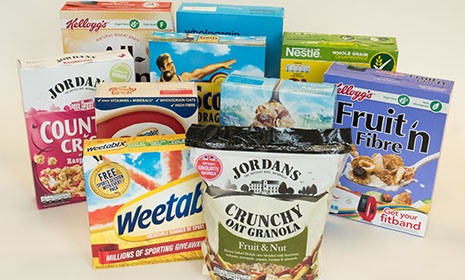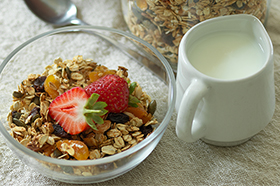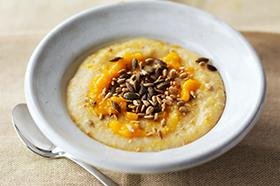
Often hailed as the 'most important meal of the day', a decent breakfast for diabetes certainly has a range of health benefits.
As well as providing nutrients, if you have diabetes, a regular healthy breakfast can help to maintain control of blood sugar, can minimise unhealthy snacking later on, and fuels your body to help you function ahead of a busy day.
The breakfast of champions
When it comes to breakfast time, cereal remains a popular, convenient, and speedy choice. With the choice on supermarket shelves growing over the years, it can be tricky to choose the healthiest option.
To make things easier, we have chosen 10 well-known cereals and looked closely at the nutritional value to see how they perform in terms of sugar, fat, and fibre.
But first, let's find out a little more about what breakfast for diabetes we should be on the look out for...

What's in a cereal?
Breakfast cereals tend to be based on grains - some are wholegrains (such as wheat, bran, oats), and others are refined grains (such as maize and rice). Many also have nuts, seeds and dried fruit added to them.
Wholegrain cereals can help to manage blood glucose levels, particularly if you have type 2 diabetes, as they release glucose more slowly as they are low GI.
Recent guidelines highlighted that, as a UK population, we are having too much sugar and not enough fibre. Fibre is important for gut health and some can help towards lowering cholesterol. Some cereals also contain vitamins and minerals such as iron, vitamin D, and B vitamins such as folic acid.
Folic acid is important for healthy red blood cells and also needs to be taken as a supplement both before, and during, pregnancy to reduce the risk of neural tube defects in unborn babies. Folic acid is especially important in pregnant women with diabetes as they need a higher than normal dose in order to prevent these birth defects.
However, beware - some cereals that may appear healthy are not always as good for you as they seem... they can contain high amounts of free sugars and are lower in fibre than is recommended.
Here are the findings. Please note that the nutritional information provided does not include milk.
*These nutritional values were accurate at the time of publication, but some of these values may have changed. Please check the food labels for the latest nutritional information.
Jordan's Crunchy Oat Granola - Fruit and Nut
| Per 100g | Per 45g serving | |
|---|---|---|
| Calories | 427 | 192 |
| Carbs | 64.2 | 28.9 |
| Sugar | 28.5 | 12.8 |
| Fat | 13.8 | 6.2 |
| Saturated fat | 4.4 | 2.0 |
| Salt | 0.03 | 0.01 |
| Fibre | 6.7 | 3.0 |
Nestle Shredded Wheat
| Per 100g | Per 45g serving | |
|---|---|---|
| Calories | 362 | 163 |
| Carbs | 68 | 31 |
| Sugar | 0.7 | 0.3 |
| Fat | 2.2 | 1.0 |
| Saturated fat | 0.5 | 0.2 |
| Salt | 0.05 | 0.02 |
| Fibre | 12 | 5.4 |
Kellogg's All Bran
| Per 100g | Per 45g serving | |
|---|---|---|
| Calories | 334 | 134 |
| Carbs | 48 | 19 |
| Sugar | 18 | 7.2 |
| Fat | 3.5 | 1.4 |
| Saturated fat | 0.7 | 0.3 |
| Salt | 0.95 | 0.38 |
| Fibre | 27 | 11 |
Weetabix
| Per 100g | Per 2 biscuit serving | |
|---|---|---|
| Calories | 362 | 136 |
| Carbs | 69 | 26 |
| Sugar | 4.4 | 1.7 |
| Fat | 2.0 | 0.8 |
| Saturated fat | 0.6 | 0.2 |
| Salt | 0.28 | 0.1 |
| Fibre | 10 | 3.8 |
Ready Brek
| Per 100g | Per 30g serving | |
|---|---|---|
| Calories | 374 | 112 |
| Carbs | 58 | 17 |
| Sugar | 1.0 | 0.0 |
| Fat | 8.7 | 2.6 |
| Saturated fat | 1.2 | 0.4 |
| Salt | 0.03 | 0.0 |
| Fibre | 7.9 | 2.4 |
Sainsbury's Wholegrain Bran Flakes
| Per 100g | Per 30g serving | |
|---|---|---|
| Calories | 365 | 110 |
| Carbs | 69.4 | 20.8 |
| Sugar | 16.3 | 4.9 |
| Fat | 2.0 | 0.6 |
| Saturated fat | 0.4 | 0.1 |
| Salt | 0.78 | 0.23 |
| Fibre | 13.8 | 4.1 |
Scott's Porage Oats
| Per 100g | Per 40g serving | |
|---|---|---|
| Calories | 374 | 150 |
| Carbs | 60 | 24 |
| Sugar | 1.0 | 0.4 |
| Fat | 8.0 | 3.2 |
| Saturated fat | 1.5 | 0.6 |
| Salt | trace | trace |
| Fibre | 9.0 | 3.6 |
Alpen - No Added Sugar
| Per 100g | Per 45g serving | |
|---|---|---|
| Calories | 375 | 169 |
| Carbs | 65 | 29 |
| Sugar | 16 | 7.2 |
| Fat | 6.2 | 2.8 |
| Saturated fat | 0.9 | 0.4 |
| Salt | 0.29 | 0.13 |
| Fibre | 7.8 | 3.5 |
Jordan's Country Crisp - Raspberries
| Per 100g | Per 45g serving | |
|---|---|---|
| Calories | 446 | 201 |
| Carbs | 67.7 | 30.5 |
| Sugar | 18.7 | 8.4 |
| Fat | 14.7 | 6.6 |
| Saturated fat | 4.6 | 2.1 |
| Salt | 0.03 | 0.01 |
| Fibre | 5.5 | 2.5 |
Kellogg's Fruit and Fibre
| Per 100g | Per 40g serving | |
|---|---|---|
| Calories | 380 | 152 |
| Carbs | 69 | 28 |
| Sugar | 24 | 9.6 |
| Fat | 6 | 2.4 |
| Saturated fat | 3.5 | 1.4 |
| Salt | 1 | 0.4 |
| Fibre | 9 | 3.6 |
The findings
We've used the government colour coding system used by many companies to help consumers make informed choices about what they eat and drink (green = low; amber = medium; red = high).
Two of the breakfast cereals - Nestle Shredded Wheat and Weetabix - were all green, meaning they're low in sugar, fat, saturated fat and salt.
Other cereals were found to have moderate to high amounts of sugar and fat. The cereals that score high in fat but low in saturated fat are ones in which the fat mainly comes from unsaturated sources.
Two of the cereals - Kellogg's Fruit and Fibre and Jordan's Crunchy Oat Granola - scored red for sugar. This sugar comes from sweetened dried fruit added to the cereal, along with added sugar.
Top tips when selecting cereal
 Be aware of portion sizes - consider whether the portion size suggested on the box is the same as the portion size you're consuming. Many people pour a larger bowl and therefore consume more calories and more carbohydrate. This is important if you're counting calories to control weight, or if you carb count to adjust the correct dose of insulin.
Be aware of portion sizes - consider whether the portion size suggested on the box is the same as the portion size you're consuming. Many people pour a larger bowl and therefore consume more calories and more carbohydrate. This is important if you're counting calories to control weight, or if you carb count to adjust the correct dose of insulin.- Weigh your cereal a couple of times to get an idea of the amount you usually consume and then keep a note of this along with other foods you consume on a regular basis. Use this weight against the per 100g values to calculate your intake.
- Another tip when carb counting - remember to allow for the extras you have added to your cereal such as milk, fruit or yogurt.
- Check the label for fibre and try to choose a cereal with a higher fibre content.
- The type of milk you choose to put on your cereal can also contribute to overall health - choosing semi-skimmed or skimmed instead of whole milk can reduce your overall fat intake for the day.
- Try to choose cereals that are graded green for sugar, where possible.
The best start, every day
Whatever your choice for breakfast for your diabetes, it's important to maintain a regular meal pattern and try to make time to eat breakfast each morning.
This will give you a great head start on your day, providing you with the fuel needed to set about your daily tasks.
If you don't feel hungry first thing, try keeping a box of healthy cereal or porridge at work. Some people find this can be a better alternative to mid-morning snacking on chocolate biscuits once you start to feel peckish.
